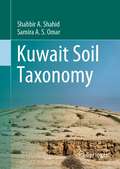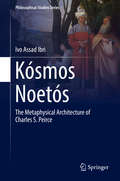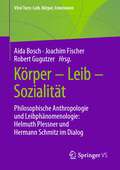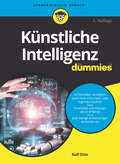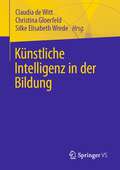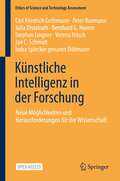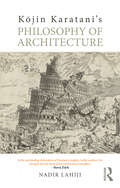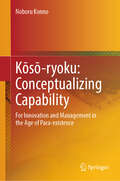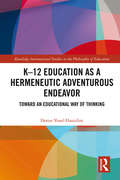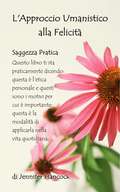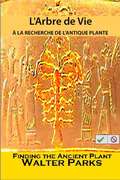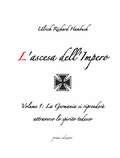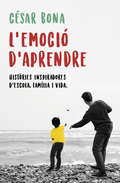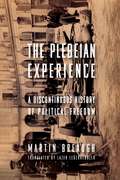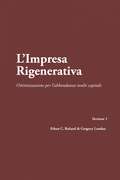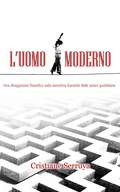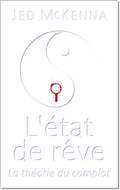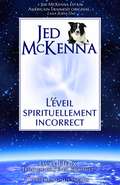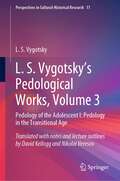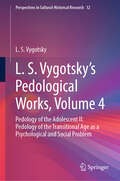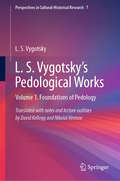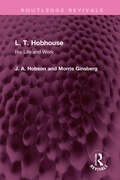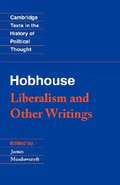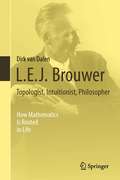- Table View
- List View
Kuwait Soil Taxonomy
by Shabbir A. Shahid Samira A. OmarThis book provides guidelines to key soil taxa in the deserts of Kuwait and guidance to associated procedures for laboratory analyses of soils, leading to land use planning on informed decisions. Soils are essential to provide food, feed, and fiber in addition to multiple ecosystem services that sustain life on earth. To achieve the above services sustainably, it is essential to use soils rationally based on their potential for specific uses. This requires establishing national soil classification systems to assess soils locally and to provide guidance to other countries where similar soils may be occurring. Once soil classification is established, it becomes easier to adopt technologies established on similar soils and environmental conditions without conducting long-term and expensive experimental trial. The taxa are established based on soil’s morphological, physical, chemical, and mineralogical properties and climatic factors. It offers opportunities to maintain future soil surveys and their correlation to the soils of Kuwait. The book is useful in other arid region countries where similar soil and environmental conditions are existing, such as Bahrain, Oman, Qatar, and Saudi Arabia. The book also has international relevance, as it was prepared by extracting definitions from USDA-NRCS keys to soil taxonomy, and sections related to soils of Kuwait are added in the book. The book is a unique and excellent addition to the international soil literature.
Kósmos Noetós: The Metaphysical Architecture of Charles S. Peirce (Philosophical Studies Series #131)
by Ivo Assad IbriThis pioneering book presents a reconstitution of Charles Sanders Peirce philosophical system as a coherent architecture of concepts that form a unified theory of reality. Historically, the majority of Peircean scholars adopted a thematic approach to study isolated topics such as semiotics and pragmatism without taking into account the author’s broader philosophical framework, which led to a poor and fragmented understanding of Peirce’s work. In this volume, professor Ivo Assad Ibri, past president of The Charles Sanders Peirce Society and a leading figure in the Brazilian community of Peircean scholars, adopts a systemic approach to Peirce’s thought and presents Peirce’s scientific metaphysics as a deep ontological architecture based on a semiotic logic and on pragmatism as criteria of meaning. Originally published in Portuguese, this book became a classic among Brazilian Peircean scholars by presenting a conceptual matrix capable of providing a clear reference system to ground the thematic studies into the broader Peircean system. Now translated to English, this reviewed, amplified and updated edition aims to make this contributions available to the international community of Peircean scholars and to serve as a tool to understand Peirce’s work in a more systemic way by integrating concepts such as experience, phenomenon, existence and reality, as well as theories such as Chance, Continuity, Objective Idealism, Cosmology and Pragmatism, in a coherent system that reveals Peirce’s complex metaphysical architecture."As the philosophical reputation of Charles S. Peirce continues to rise to first-tier prominence in the history of American philosophy, Ivo Ibri’s Kósmos Noetós assumes a unique status in both a pioneering and a magisterial work of transcontinental Peirce scholarship. This original work of this internationally renowned scholar and editor, and Professor of Philosophy at the Pontifical Catholic University of San Paulo, penetrates to the heart of Peirce’s architectonic system of phenomenological, metaphysical, and semiotic categories which heuristically characterize our world as “a universe perfused with signs.” Ibri’s own synergistic commentary on the radiating registers of Peirce’s cosmogonically and pragmatistically conceived “one intelligible theory of the universe” also instructively contributes to the illumination of significant nodes of interface with a range of relevant theoretical trends in the contemporary academy; as well, it places Peirce in the company of such thinkers as Plato, Aristotle, Plotinus, Kant, and Schelling who preceded Peirce in providing a legacy of first-tier reasoning on our intelligibly developing world. Kosmos Noetos impresses as Ibri’s pure, lucid, passionately thought-loving, philosophical articulation of his own and as the indispensable prolegomena to all future Peirce studies." David Dilworth, State University of New York at Stone Brook – USA"Ivo Ibri has offered us in this exquisite work a framing of the inner logic of Charles S. Peirce's core metaphysical vision and its existential implications. It is a deep and nuanced exploration of the internal dynamics of Peirce’s central metaphysical categories, developed through rigorous and detailed attention to the evolution of Peirce’s thought on the ‘vitally important topics’ of the appearing, the reality, and the intelligibility of the world. The two-leveled format of the book, an intricate weaving of Peirce’s texts and discursive elaboration and linkage by Ibri, gives it a distinctive feel and is the bedrock of its value. The book is a remarkable combination of presentation and analysis. It is informed by Ibri’s deep philosophical culture and is a gentle and convincing argument for the centrality of metaphysics in understanding Peirce’s thought. It offers in a new way indispensable suggestions for our own attempts to think about our places in an evolving universe with the aid of Peirce and offers threads of thought to be followed up by others." Robert E. Innis, University of Massachusetts Lowell – USA
Körper – Leib – Sozialität: Philosophische Anthropologie und Leibphänomenologie: Helmuth Plessner und Hermann Schmitz im Dialog (Vital Turn: Leib, Körper, Emotionen)
by Joachim Fischer Robert Gugutzer Aida BoschDas Buch möchte die theoretischen Ansätze von Helmuth Plessner und Hermann Schmitz in den Dialog bringen und für die soziologische Forschung fruchtbar machen. Entfaltet werden anthropologisch-phänomenologische Perspektiven auf Wechselwirkungen, Konflikte, Überschneidungen. Ergänzend dazu wurden weitere Artikel eingeworben, die mit dem gleichen theoretischen Fokus eine breite thematische Vielfalt abdecken. Gemeinsam ist den Beiträgen des Bandes eine intensive Auseinandersetzung sowohl mit Plessner als auch mit Schmitz.
Künstliche Intelligenz für Dummies (Für Dummies)
by Ralf OtteKünstliche Intelligenz begegnet uns immer mehr im täglichen Leben. Egal ob intelligente Autos, Roboter, Chatbots oder Systeme, die uns im Schach und Go besiegen, KI wird immer wichtiger. Ralf Otte beschreibt präzise und dennoch einfach diejenigen Algorithmen, die all das ermöglicht haben, erläutert Beispielanwendungen aus der Industrie, erklärt die zugrundeliegende Mathematik und zeigt darüber hinaus klare Grenzen für die Künstliche Intelligenz der nächsten Jahre auf. In dem Buch werden die mathematischen Grundlagen der KI besprochen, sie sind jedoch nicht zwingend notwendig, um die Kernaussage des Buches zu verstehen.
Künstliche Intelligenz in der Bildung
by Claudia De Witt Christina Gloerfeld Silke Elisabeth WredeDer Band geht von einer bildungswissenschaftlichen Perspektive auf Künstliche Intelligenz (KI) aus. Er enthält bildungstheoretische Standpunkte zum Einfluss von KI auf Bildung und stellt didaktische Positionen bzw. Gestaltungsansätze von KI in Schule, der beruflichen (Weiter-)Bildung und Hochschulbildung vor. Neben Ansätzen zur Kompetenzentwicklung mit KI in der Bildungspraxis hebt der Band zudem den erklärbaren, ethisch orientierten und souverän beherrschbaren Umgang mit KI hervor.
Künstliche Intelligenz in der Forschung: Neue Möglichkeiten und Herausforderungen für die Wissenschaft (Ethics of Science and Technology Assessment #48)
by Peter Buxmann Jan C. Schmidt Carl Friedrich Gethmann Julia Distelrath Bernhard G. Humm Stephan Lingner Verena Nitsch Indra Spiecker genannt DöhmannDieses Buch ist eine Open Access Publikation.Der lange gehegte Traum von künstlicher Intelligenz (KI) wird in unserer Alltagswelt zunehmend Realität. Damit verbinden sich hohe gesellschaftliche Erwartungen, aber auch Sorgen hinsichtlich einer schleichenden Entmündigung des Menschen. Am Beispiel des Forschungssektors lotet dieser Band die Optionen, Entwicklungschancen und Risiken von KI-Techniken für die Zukunft des wissenschaftlichen Erkenntnisprozesses und der darauf beruhenden technischen Entwicklungen aus. Zu diesem Zweck wird zunächst der Stand der KI-Technik und ihrer Anwendungen dargestellt. Es folgen wissenschaftsphilosophische Untersuchungen zur Frage der Ersetzbarkeit des forschenden Menschen durch KI und zu erwartenden Veränderungen in der wissenschaftlichen Forschung. Weitere Abschnitte widmen sich den Folgen für die Arbeitswelt von Forschern/Forscherinnen sowie den durch KI erzeugten neuen Herausforderungen für die rechtliche Regulierung im Spannungsfeld von Wissenschaftsfreiheit und Datenschutz. Der Band schließt mit Empfehlungen für die verantwortlichen Akteure in Wissenschaft, Forschungspolitik und Gesellschaft aus interdisziplinärer Perspektive.
Kōjin Karatani’s Philosophy of Architecture
by Nadir LahijiIn this book, Nadir Lahiji introduces Kōjin Karatani’s theoretical-philosophical project and demonstrates its affinity with Kant’s critical philosophy founded on ‘architectonic reason’. From the ancient Greeks we have inherited a definition of the word ‘philosophy’ as Sophia—wisdom. But in his book Architecture as Metaphor Kōjin Karatani introduces a different definition of philosophy. Here, Karatani critically defines philosophy not in association with Sophia but in relation to foundation as the Will to Architecture. In this novel definition resides the notion that in Western thought a crisis persistently reveals itself with every attempt to build a system of knowledge on solid ground. This book reveals the implications of this extraordinary exposition. This is the first book to uncover Kōjin Karatani’s highly significant ideas on architecture for both philosophical and architectural audiences.
Kōsō-ryoku: For Innovation and Management in the Age of Para-existence
by Noboru KonnoThis book examines conceptualizing capability (kōsō-ryoku), the most important ability for thriving in the era of innovation. A new approach, "formative conceptualizing capability," is proposed as the core knowledge methodology for innovation and management, which is is a fundamental human ability that goes beyond the boundaries between cognitive and tangible realities to shape concepts and drive innovation. Traditional studies on imagination in Western philosophy are combined with knowledge creation theory based on Eastern way of thinking. The book argues the capability should be at the core of innovation management, offering insights and principles for navigating the challenges of the present age. Japan has experienced the world's earliest capitalist setback and is stuck in a prolonged stagnation. The author maintains, however, that what is needed in this coming chaotic era is not only “imagination”, as it would be called in English, but also the power of creating kōsō, the Japanese term for “formative concept”. The author has a proven track record in research and practice on knowledge creation theory, innovation management, design thinking, and scenario planning. He has reorganized and set forth in this book the perspectives he has proposed under the theme of kōsō-ryoku to present a new methodology of knowledge for living in the twenty-first century.
K–12 Education as a Hermeneutic Adventurous Endeavor: Toward an Educational Way of Thinking (Routledge International Studies in the Philosophy of Education #17)
by Doron Yosef-HassidimConsidering the role of compulsory mass education and schooling in a democratic society, this book introduces an alternative vision for K-12 education as an "adventurous endeavour." Grounded in a strong theoretical framework, Yosef-Hassidim reveals the negative impact of instrumentalization of schools: when education is considered a social and political instrument, it serves dominant social forces’ interests rather than students’ or humanity as a whole. Offering conceptual and pragmatic frameworks to limit political influence on schooling, the author proposes a new hermeneutical structure that restores education’s agency and separates it from external social forces, and provides the foundation for regarding K-12 education as a sovereign social sphere in its own right.
L'Approccio Umanistico alla Felicità
by Jennifer Hancock Stefania BaetiiSaresti meravigliato di scoprire come può essere semplice la vita se fai dall'etica una priorità! Questo libro ti sta praticamente dicendo: questa è l'etica personale e questi sono i motivi per cui è importante; questa è la modalità di applicarla nella vita quotidiana ed è per questo che, così facendo, potrai vivere una vita più felice e produttiva. La vita non è facile. È una sfida continua. Come affrontiamo queste sfide determina il nostro successo nella vita. Se vuoi capire meglio come ragionare in maniera efficace sulle scelte che ti tocca fare, questo libro ti aiuterà. L'Approccio Umanistico alla Felicità è stato concepito come strumento per incoraggiare i giovani a pensare e a mettere in discussione i valori e l'etica personale, applicandoli alle prese di decisione quotidiane. In altre parole, come possono dare il meglio di se stessi come persone etiche. Come fanno ad essere etici con i loro amici? E perché dovrebbero? Quali sono i valori a cui rapportarsi quando devono decidere se fare o no uso di droghe e di alcol? Come e perché dovremmo essere etici quando usciamo con una persona o quando ci lasciamo? Come possiamo applicare a noi stessi questi valori durante un grande dolore? E, la cosa principale, perché tutto questo ha importanza?
L'Arbre de Vie: À LA RECHERCHE DE L’ANTIQUE PLANTE
by Walter ParksDieu a planté l'Arbre de Vie dans le jardin d'Éden. Mathusalem a vécu 969 ans comme les autres Patriarches bibliques. Les anciens rois sumériens vivaient, eux, encore plus longtemps. D'autres peuples anciens dont les descendants sont devenus des Indiens appelaient le jus des feuilles de l'Arbre de Vie, le Soma. Ils le buvaient pour augmenter leur espérance de vie. Le Déluge de Noé a détruit l'Arbre de Vie. Le roi Gilgamesh l'a cherché et l’a trouvé sous les eaux de crue. Mais, hélas, l'arbre a été détruit pour toujours et Dieu nous a dit qu'Il a limité notre durée de vie à 120 ans. Qu'est-ce que l'Arbre de Vie et comment fonctionnait-il : il a fourni un ingrédient qui a réactivé les gènes de la télomérase de notre corps. Un test en laboratoire a prouvé que cette télomérase pouvait rendre les cellules humaines immortelles. Les programmes médicaux en cours finiront par nous rendre immortels. Les progrès réalisés avec les ingrédients de l'Arbre de Vie sont tels que certaines personnes deviendront aujourd'hui immortelles.
L'ascesa dell'Impero: Volume 1: La Germania si riprenderà attraverso lo spirito tedesco
by Ulrich Richard HambuchIl popolo dei poeti e dei pensatori, che sono stati per due volte vittime di terribili guerre mondiali nella storia recente, è di nuovo in una profonda crisi in questi giorni e si trova a un bivio. Negli ultimi sette anni, in questo contesto sono state prodotte innumerevoli, analiticamente brillanti, ma sobrie, lunghe e per la maggior parte incomprensibili e quindi in ultima analisi solo opere fugaci, in cui gli autori si sono sentiti chiamati a scoprire e denunciare le cose che ci hanno consapevolmente o inconsciamente oppresso negli ultimi decenni. In definitiva, però, tutti gli autori che conoscevo non sono riusciti a delineare un'alternativa olistica e sostenibile allo stato attuale. A questo bisognava porre rimedio. Oggi la considero una coincidenza del destino, che per alcuni anni non mi ha permesso da più parti di portare avanti la mia attività abituale in modo permanente e che mi ha portato, da ora in poi, a dedicarmi in solitudine e imparzialità al tema della ricerca della verità. Come persona che, dopo un po' di tempo di apprendimento, di pensiero, di sentimento e di pausa, è in grado di agire, non ho potuto trovare casa in nessun partito, in nessuna azienda o luogo della Repubblica Federale Tedesca. Così ho deciso senza ulteriori indugi di creare questa casa ideale politica, laica e spirituale per me stesso.
L'emoció d'aprendre: Històries inspiradores d'escola, família i vida
by César Bona«Un viatge cap a la diversitat; una reflexió sobre l'èxit, el fracàs i les expectatives que condicionen nens, nenes i adolescents, i sobre com podem donar-los la possibilitat de construir el seu propi futur.» Què és l'èxit per a tu? I el fracàs? I si penses en nens i nenes, què contestaries? Quan mires els que t'envolten, consideres que no tens prejudicis? Hi ha certes creences que distorsionen la teva manera de veure la vida? Com a docents, moltes coses no ens les van ensenyar a la universitat; com a pares, aprenem a força d'assaig i error. L'empatia és un joc que cal practicar cada dia, i això no implica allunyar-se del que ets sinó acostar-se al que l'altra persona és i sent. Al món hi ha gairebé vuit milions de persones, cadascuna diferent de la resta. Les diferències són un valor, i no un inconvenient. Quan entenguem això, començarem a veure la vida d'una altra manera, amb la riquesa que proporciona la diversitat. En aquest llibre trobaràs històries inspiradores que conviden a reflexionar sobre totes aquestes preguntes i sobre la manera com mirem els qui ens envolten. «No és el que mires, és el que veus», deia Thoreau. I cada paraula, cada gest, compta. La crítica ha dit...«César obre nous horitzons per als nens. Està creant líders del futur animant-los a agafar les regnes per emprendre accions i canviar actituds -i pràctiques- de la societat.»Jane Goodall «La meva primera descoberta del 2015 ha estat conèixer l'existència del professor César Bona. És un plaer comprovar que, de tant en tant, apareix un personatge humil capaç de despertar admiració unànime [...]. Ensenya els seus alumnes a gaudir de la natura i dels animals, i a fer pel·lícules, jugar, imaginar i pensar en els altres. També els ensenya anglès, història imatemàtiques, però el que ell considera bàsic és que siguin bones persones.»Nativel Preciado, Tiempo
L'experience plebeienne
by Martin BreaughHow do people excluded from political life achieve political agency? Through a series of historical events that have been mostly overlooked by political theorists, Martin Breaugh identifies fleeting yet decisive instances of emancipation in which people took it upon themselves to become political subjects. Emerging during the Roman plebs's first secession in 494 BCE, the plebeian experience consists of an underground or unexplored configuration of political strategies to obtain political freedom. The people reject domination through political praxis and concerted action, therefore establishing an alternative form of power. Breaugh's study concludes in the nineteenth century and integrates ideas from sociology, philosophy, history, and political science. Organized around diverse case studies, his work undertakes exercises in political theory to show how concepts provide a different understanding of the meaning of historical events and our political present. The Plebeian Experience describes a recurring phenomenon that clarifies struggles for emancipation throughout history, expanding research into the political agency of the many and shedding light on the richness of radical democratic struggles from ancient Rome to Occupy Wall Street and beyond.
L'impresa rigenerativa
by L. Pipero Ethan Roland Gregory LanduaIl presente libro è “l’eccedenza intellettuale” e il capitale di esperienza di una sana e vibrante comunità di pratica. Non è stato scritto da due persone, ma è il risultato di anni di conversazione tra imprenditori, azionisti, agricoltori, ideatori di permacolture e investitori appassionati e intelligenti, persone che vogliono cambiare il mondo e che lavorano ogni giorno per sanare le relazioni tra la nostra società umana, smemorata e sconnessa, e la terra nutrice.
L'uomo moderno
by Annarita Tranfici Cristiane SerruyaLo stato moderno dell'uomo, la sua vita, i suoi pensieri e i suoi sentimenti sono stati analizzati dall'autrice con uno stile poetico, diretto e sensibile. Un testo contemporaneo che indaga sulle angosce e sui desideri dell'uomo moderno, sui suoi bisogni e progetti, sui suoi sogni e sulle sue utopie,e che invita il lettore a ripensare alle sue azioni quotidiane. Prefazione a cura di Carla Francalanci, Dottore di ricerca in Filosofia presso il Boston College. - Medaglia d'oro nella categoria "Scritti motivazionali per giovani adulti" concessa dalla prestigiosa istituzione "Literary Classic International Book Award and Review", 2013. - Medaglia di bronzo nella categoria "Saggistica - Racconto breve"; Finalista al Book Award nella categoria "Saggistica - Racconto breve - Religione/Filosofia", tutti assegnati dal "Readers' Favorite International Book Award", 2013. - Menzione d'onore dalla Facoltà di Giurisprudenza della Pontifícia Universidade Católica do Rio de Janeiro, 1988.
L'état de rêve - La théorie du complot
by Jed Mckenna Laura DinrathsSi la vie n’est qu’un rêve, à quoi nous éveillons-nous ? La prémisse centrale de L’état de rêve : la théorie du complot est l’affirmation certes ridicule mais indéniablement vraie que l’univers n’existe pas. C’est quelque chose que vous pouvez comprendre conceptuellement, comme en regardant un documentaire sur l’Antarctique, ou empiriquement, en déménageant en Antarctique. Ou grâce à un phénomène lié où vous vous endormez devant le documentaire et vous réveillez dans un désert de glace. Ça doit être étrange, mais la vérité est que vous dormez dans un endroit solitaire et désolé en rêvant que ce n’est pas le cas, et que c’est là que vous vous retrouverez en vous réveillant.
L'éveil spirituellement incorrect
by Jed Mckenna Laura D.L’Éveil Spirituellement Incorrect n’est pas un genre d’éveil spirituel – c’est le seul genre. LA MARQUE D’UN VRAI MAÎTRE est de pouvoir exprimer un sujet extrêmement complexe avec une simplicité troublante. Jed McKenna est un tel maître, et l’éveil spirituel est son sujet. Son premier livre, L’éveil spirituel : La chose la plus dingue, est devenu un classique immédiat et l’a établi en tant qu’enseignant spirituel doté d’une profondeur et d’une clarté surprenantes. Son second livre, L’éveil spirituellement incorrect, nous emmène faire un tour fascinant dans l’état éveillé – ce qu’il est et ce qu’il n’est pas, qui y est et qui n’y est pas, comment l’atteindre et comment atteindre un meilleur état. Les surprises exquises abondent, y compris la révélation de ce qui est sans doute la plus grande œuvre spirituelle de tous les temps – cachée au vu et connue de tous. Whitman, Melville, Thoreau, Mark Twain et U.G. Krishnamurti y apparaissent, et une étudiante du premier livre revient partager les écrits de son autolyse spirituelle. Encore plus surprenants, les subtils efforts de l’auteur pour éloigner le lecteur de l’éveil et l’attirer vers un état plus désirable et plus accessible. Si tu ne me trouves pas du premier coup, garde courage, Si je t’échappe à un endroit, cherche ailleurs, Je suis arrêté quelque part et n’attends que toi. - Walt Whitman Les livres de Jed McKenna ne sont pas destinés à tous. Ils sont destinés à ceux qui sont fatigués du carrousel spirituel et prêts à confronter la réalité sans fard du processus d’éveil. Si vous chérissez vos enseignants, leurs atours et parures, Jed n’est peut-être pas ce qu’il vous faut, mais lorsque vous serez prêt à descendre du manège et à entreprendre le voyage, Jed McKenna est le mec que
L. S. Vygotsky's Pedological Works, Volume 3: Pedology of the Adolescent I: Pedology in the Transitional Age (Perspectives in Cultural-Historical Research #11)
by L. S. VygotskyThis book contains the first complete translation of the first half of the Pedology of the Adolescent by the Soviet thinker, educator, and teacher L.S. Vygotsky. It was the longest work published in his lifetime and was a correspondence course written by Vygotsky for teachers across the Soviet Union. The book is a sustained argument about the borders of pedology, the nature of the transition between childhood and adulthood, and the concrete character of the distinction between the lower psychological functions that we largely share with animals and those that are specific to fully socialized humans. After an initial methodological introduction, three kinds of maturation—general anatomical, sexual, and sociocultural—are explored. This book will be followed by a companion volume covering pedology of the transitional age as a psychological and social problem.
L. S. Vygotsky's Pedological Works, Volume 4: Pedology of the Adolescent II: Pedology of the Transitional Age as a Psychological and Social Problem (Perspectives in Cultural-Historical Research #12)
by L. S. VygotskyThis book contains a new translation of the second half of the Pedology of the Adolescent by the renowned Soviet thinker, educator and teacher L.S. Vygotsky. It was a correspondence course written by Vygotsky for teachers across the Soviet Union, and it constitutes the longest work published in his lifetime. Four chapters have never been translated before and appear here for the very first time. With this volume, Vygotsky concludes the sustained argument he commenced in Vol. 3 Pedology of the Adolescent I: Pedology in the Transitional Age, establishing the borders of pedology, the nature of the transition between childhood and adulthood, and the concrete nature of the distinction between the lower psychological functions we largely have in common with animals and those that are specific to fully social humans. In this volume Vygotsky "puts flesh on the skeleton" of his working hypothesis concerning the interests and the development of concepts in the psychology of the adolescent. He then frames concepts as a special case of developing higher psychological functions, and demonstrates the roots of that development in the social environment. Many of the problems Vygotsky broaches in these new chapters--the choice of a profession, the initiation of the adolescent into working life--are still of immediate, not to say urgent, relevance today. The volume concludes with a remarkable vision of a society "where production is organized for the producers" that still seems far ahead of its time and still ahead of our own.
L. S. Vygotsky's Pedological Works: Volume 1. Foundations of Pedology (Perspectives in Cultural-Historical Research #7)
by L.S. VygotskyThis book provides both a lost last word and a firm first foundation: seven lectures, given in the last months in the life of the Soviet thinker, teacher, and writer L.S. Vygotsky, offer us the most comprehensive and developed form of his thoughts on the child, expressed in the most fundamental and even popular form that Vygotsky himself used with his beginner-level students. As the title of Vygotsky’s course indicates, these are foundations upon which cultural-historical researchers can rebuild the lost science of “pedology”, a holistic approach to child development based on the dynamic unity of physical and mental development. Volume One includes translations of seven of Vygotsky’s lectures that reflect his approach to pedology; the method of pedology and the “methodics” of the unit of analysis; the role of heredity and social environment in child development; and general laws of development in childhood that will help parents and teachers understand the way the child’s endocrine system, nervous system, and mind change as the child enters a culture and learns to make history.
L. T. Hobhouse: His Life and Work (Routledge Revivals)
by Morris Ginsberg J. A. HobsonFirst published in 1931, L. T. Hobhouse is an amalgamation of the late social philosopher L. T. Hobhouse’s personal life and academic work. The first part of this volume is a brief biography by Mr. J. A. Hobson, with added impressions by personal friends and colleagues. It is followed by an account of his philosophy and sociology written by Professor Morris Ginsberg, his pupil and successor at the London School of Economics. Third section consists of some collected essays illustrative of his various capacities and interests. This book will be of interest to students of philosophy and sociology.
L. T. Hobhouse: Liberalism and Other Writings
by James Meadowcroft L. T. HobhouseL. T. Hobhouse was the most sophisticated intellectual exponent of liberal social reform in the early years of the twentieth century. This edition of his classic Liberalism, which includes a number of his other contemporaneous writings, will be of interest to a broad range of students and scholars in politics and the history of political thought.
L.E.J. Brouwer – Topologist, Intuitionist, Philosopher
by Dirk Van DalenDirk van Dalen's biography studies the fascinating life of the famous Dutch mathematician and philosopher Luitzen Egbertus Jan Brouwer. Brouwer belonged to a special class of genius; complex and often controversial and gifted with a deep intuition, he had an unparalleled access to the secrets and intricacies of mathematics. Most mathematicians remember L.E.J. Brouwer from his scientific breakthroughs in the young subject of topology and for the famous Brouwer fixed point theorem. Brouwer's main interest, however, was in the foundation of mathematics which led him to introduce, and then consolidate, constructive methods under the name 'intuitionism'. This made him one of the main protagonists in the 'foundation crisis' of mathematics. As a confirmed internationalist, he also got entangled in the interbellum struggle for the ending of the boycott of German and Austrian scientists. This time during the twentieth century was turbulent; nationalist resentment and friction between formalism and intuitionism led to the Mathematische Annalen conflict ('The war of the frogs and the mice'). It was here that Brouwer played a pivotal role. The present biography is an updated revision of the earlier two volume biography in one single book. It appeals to mathematicians and anybody interested in the history of mathematics in the first half of the twentieth century.
